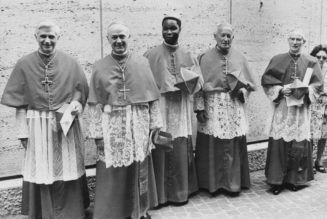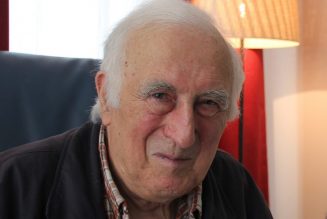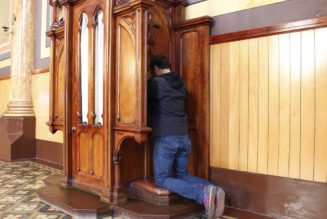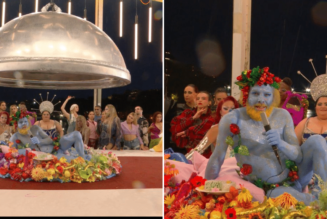
There are things that, at first blush, might appear marginal but are in truth major. Since it was introduced by the Catholic priest Mike Schmitz, who goes by Father Mike, in January 2021, the little-heralded “The Bible in a Year (With Fr. Mike Schmitz)” has been the most popular Apple religion podcast for a majority of 2021 and 2022 and has even, on two occasions, reached the No. 1 spot among all podcasts on Apple’s platform. The show has been downloaded 350 million times and an average of 750,000 times a day. Its popularity is easy to understand — the show goes down smoothly. Each 20-to-25-minute installment, designed according to a study plan developed by the Catholic biblical scholar Jeff Cavins, features two or three short scriptural readings and a pithy reflection by Father Mike, an affable 47-year-old Midwesterner whose upbeat and self-deprecating manner — not to mention regular-guy good looks — exude strong Ted Lasso vibes. The staggering success of the podcast has helped turn its host, whose day job is as a chaplain at the University of Minnesota Duluth and the director of the youth ministry for the Duluth diocese, into a kind of celebrity. He travels the country giving speeches, and some of his YouTube videos have racked up millions of views. This all comes at a moment, of course, when the church, like so many of our institutions, finds itself firmly at the heart of roiling social tensions — a fact of which Father Mike is keenly conscious. “I know a lot of my own brokenness and faults,” he says about the challenge of becoming a public figure. “I hate the idea of misrepresenting God or the church because of them.”
Given your podcast’s popularity, I’m sure your listeners constitute a pretty broad demographic. But in your daily life you minister to college kids, and young people are among those least likely to identify as Catholic. What accounts for that? Well, a scary number for me — it isn’t scary, it’s saddening — is that many Catholics that age end up leaving the church. The interesting thing is that lots of those who leave say they had a positive experience. So it’s not necessarily about having nicer interactions. I think it’s about: Are we letting them ask the questions they have? Are we engaging with the facts of their lives and trying to offer what the Catholic Church and Christianity has to offer? I’m a Catholic because I believe it’s true. I think that goes a long way, but, gosh, the state of our engaging people in a way that’s compelling is not very great.
Do you think that engagement needs to be more about meeting people where they are on things like homosexuality, gay marriage and abortion rather than where the church believes they ought to be? When it comes to some difficult teachings for people to wrap their head around, wrap their heart around, you named them. With the big questions — and those are big ones — rather than say, “Here’s the answer,” I’ll ask, “OK, where are you at with this?” Someone might say, “I want to know why the church teaches this.” Someone else might say, “I want to know if there’s hope for me, because this is part of my story.” I hopefully won’t just launch into the answer that makes the most sense to me. I want to hear where the questions are coming from, what someone is really asking. Often with some of these questions — not always — embedded within them are other questions like: Do I still matter? What does this mean for me and my life, me and my family?
Do your answers ever change? I would say that probably the way I articulate certain things has changed. I don’t want to impose any belief or way of life on anyone. I only propose. So just being comfortable in the tension, being comfortable in maybe no resolution at the end of this conversation, but hopefully we can leave with me knowing you a little better so I can care about you more. Hopefully you know that I care about you and that it’s not just Father Mike that cares about you, but, whatever’s going on in your life, God cares about you. Actually hearing that and receiving it — God cares about you — is huge. So with some of these hot-button issues, if I haven’t changed your mind, that’s fine. But if you can now have this thing you hold onto, which is true — that God cares about you — then that’s a win.
Father Mike in his rectory, where he records ‘‘The Bible in a Year (With Fr. Mike Schmitz).’’ From Bulldog Catholic
You said you only want to propose and never impose. Along those lines, how do you talk to your students about staying true to one’s religious beliefs and advocating for them while also living in a pluralistic society? We did a series on this for our college students last spring. There were no elections coming up; it was never connected to any action other than, Here are some principles that the church has formulated that give us some wisdom in moving forward. An example would be the right to private property and the universal destination of goods. The right to private property: Everyone has a right to own what they own. If this is your coat, that’s your coat. If this is your car, that’s your car. At the same time, there’s a thing called the universal destination of goods, which means that all of the resources of the earth are for everybody. You would say the universal destination of goods seems like a principle of the Democratic Party and the right to private property sounds Republican. The church says both those things are principles we need to hold in tension. Because once one is used to take away the other, then you’ve fallen off the road. Our students say, “Whom do I vote for then?” But I don’t really wade into politics. Instead we’re offering principles that I believe are sound.
According to those principles, does a woman’s body count as her own property? That’s a great question. One of the arguments that people are making for the right to an abortion would be, This is my body. One would not argue against that. But there’s also another human being involved in this. That human being also has the right to bodily autonomy. That’s why they call it the right-to-life movement. Not that a woman does not have bodily autonomy or rights over her own life. It’s, I have rights over my own body, but I don’t have rights over someone else’s life or body. The Catholic Church’s position, and the Judeo-Christian position for millenniums, has been that the rights of this unborn baby are the same as the rights of the mom.
Before you and I spoke, I asked if you could send me the names of some books that were important to you, all of which I then read. And I’ve been listening to your podcast for a while and watching your YouTube videos. I also read almost all the books you’ve written. There’s a lot of love and beauty in so much of it. But I can’t, as you put it, wrap my heart around any teaching saying that gay sex is “disordered,” or that because of an abortion ban at six weeks, a 10-year-old girl who was impregnated via rape should have to travel from one state to another to get one, or that women with ectopic pregnancies could potentially be denied procedures. Can you help me understand where the heart is in that? Those questions are the ones that probably people would have some of the biggest objections to because there is such heart behind the whole thing. Where even to begin? Maybe the first thing would be trying to articulate how Christians, how Catholics, how I see people. Whether that be someone seeking an abortion for the reasons you mentioned or any other reason, or someone who’s like, “My entire life I’ve been attracted to members of my same sex.” In both of those cases, one of the common experiences is a feeling of I’m alone. There can be a great experience of shame, of isolation. So one of my impulses is not to say, “Well, here’s what the church teaches and here’s what this means.” It is to say, “Here’s an opportunity for you to be seen, for someone to know this thing that you maybe kept secret because of shame or whatever reason, to hear that you’re loved truly, without condition.” Maybe someone won’t believe me, but that’s the first thing. Because I believe that while our circumstances can be unique, every one of us knows what it is to be rejected and to experience shame. That’s the baseline. What do you think?
Well, your answer was about how you try to talk with people about these things. I’m trying to better understand the heart behind the teaching. That’s the piece I’m missing and want to understand. Does that make sense? I think so. Here’s how I see it. Every human being is made in God’s image and likeness, which means intrinsically every human being has worth and is good. That’s the first step. The second step is that we believe in original sin. Here’s this world, and here’s these people that are good but broken. Every one of us has experienced that brokenness in any number of ways. Every human being I’ve talked to has, to some degree, a disordered, we say broken, we say an issue with sexuality. The Christian message in all this is: You are good. You matter. God knows your name, and he’s entered into the brokenness so that you don’t have to be there alone. It doesn’t have to be the thing that defines your life. All of Christianity can be summed up in this one question and answer: Does God have permission to love you as you are? If I say he can love me now, it’s not just a matter of a feeling of this affection. It’s letting that love change me. When I say that, I’m not saying those desires are gone or that I’m no longer pregnant. What I’m saying is, OK, if God has my permission to love me as I am right now, that means I don’t have to walk in shame. That means I’m not walking alone. It means, in many ways, that my heart gets to be changed. When it comes to the big issues, the question is still the same, and the answer needs to be given: Does God have your permission to love you as you are right now? Yes or no?
Do I have it right that you have a gay brother? I do. That’s part of the story.
Do you guys have these kinds of conversations? I hesitate — I’ve become more convinced that he gets to tell his story as opposed to me telling his story for him. But we trust each other, and we’ve been able to have, I think, good heart-to-heart conversations — even if at the end of the conversation we’re not on the same page. There is that sense of, What do I want? I might want a lot of things, but one thing I want is him to know that, at the end of the day, I love you. I respect you. What more can I offer?
Father Mike saying Mass for University of Minnesota Duluth students while traveling in Arizona. From Ascension Press
Earlier you mentioned the intrinsic worth of all human life. Do you think the church does enough advocating for activity and legislation that supports the life of the mother and child after the birth? I would say that one of the reasons why the pro-life position seems to the culture at large like an anti-abortion position is — here’s an example: If an overweight person comes into the E.R. with a gunshot wound, you’re not going to say, “OK, we need to get you on a regimen of diet and exercise.” It’s like: “No, you’re bleeding out. After this gets taken care of, we’ll address the underlying health issues.” In our minds abortion is the gunshot wound. In our diocese there are multiple women’s care centers that, yes, they’re pro-life, meaning anti-abortion, but they’re all about providing options for women afterward who are in crisis pregnancies. People say things like you mentioned: “You only care about having the baby born. You don’t care about what happens after the birth.” Actually, no. There are all these services that the church and members of the church are providing to help take care of moms and children. Now with legislation, that’s a whole issue that I’m not very familiar with. I won’t be able to speak to legislation.
Sorry, with the gunshot-wound analogy — I don’t quite follow why it’s not the mother’s life that needs the urgent care. I wouldn’t argue that. I would agree that the person in the midst of that is in a crisis. That’s real. That’s one of the reasons why, at least in our town here in Duluth, we’ve had students who graduated from U.M.D. who have started these women care centers, because they’re like: “I’m pro-life, and when I mean pro-life, I don’t just mean anti-abortion. I mean, Let’s help moms. Let’s help their children. Let’s help them get through the crisis so that they can start living not in crisis mode.”
Undergirding some of the issues we’re talking about are anxieties and questions about the proper separation of church and state. A lot of people are worried about what they see as the increasing blurriness of that boundary, which other people might see as that boundary’s religiously proper realignment. From where you stand on the pulpit, how do you think about that issue? The United States is such a unique country. It’s a government of the people, by the people, for the people. We as a people are the nation. We are not just the governed but we govern ourselves. That’s one of the reasons, I think, that John Adams said this representative republic can only be successful if we’re “a moral and religious people.” Because then we’d be informed by a standard outside of ourselves that we answer to. That makes sense to me. My perspective on religious people would be that there is no desire to ruin anyone’s life. There is a desire simply to affirm the dignity of everyone’s life. But I’m not talking about theocracy. I’m talking about government of the people, by the people, for the people. Which means all of us get a say. From the deeply religious to the convicted atheist and everyone in between. No one gets to ram it down anyone else’s throat, but we all have a say. When it comes to the pulpit, whenever it comes to an issue I merely present principles, never policy. I don’t know if I’ve ever advocated a policy. Instead it’s, Let’s present principles and, trusting people, apply them as best we can.
This is not confession but — Great! [Laughs.]
But one thing I want to know is, right now, what are your biggest struggles? Without this being confession, David, gosh, my mind goes to doing it all, getting the work done.
Dig deeper. I don’t want to give you that answer. That seems lame. Here’s a thing: Even for this conversation, I have maybe an inordinate preoccupation with not wanting to misrepresent the Lord, the church, whether that’s because “He wasn’t smart enough” or “He wasn’t patient enough, wasn’t present enough.” One of the things that really weighs on me is with all the stuff that’s going on — we did “The Bible in a Year,” we’re doing “The Catechism in a Year,” we’re going to build a Newman center — I realize here on campus that the fatherhood is the closest thing I hold to my heart about my life. The thing that matters the most is being a spiritual father. Are the students sitting here thinking, Yeah, Father Mike’s not around because he’s doing this other stuff, he’s kind of an absentee spiritual father? That keeps me awake at night. I don’t want to fail these people who have been entrusted to me. I want to be there for them.
This interview has been edited and condensed from two conversations.
David Marchese is a staff writer for the magazine and the columnist for Talk. Recently he interviewed Neal Stephenson about portraying a utopian future, Laurie Santos about happiness and Christopher Walken about acting.
Join Our Telegram Group : Salvation & Prosperity
![The New York Times Magazine profiles Catholic podcasting star Father Mike Schmitz [NYTimes paywall]…](https://salvationprosperity.net/wp-content/uploads/2022/08/the-new-york-times-magazine-profiles-catholic-podcasting-star-father-mike-schmitz-nytimes-paywall-1050x600.jpg)






